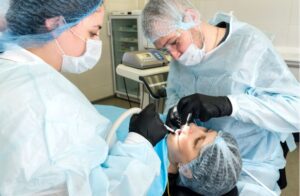Afraid of the Dentist?
Are you afraid of going to the dentist? Have you ever skipped a dentist appointment because you were anxious about what might happen there? Have you tried to ignore tooth pain rather than seek treatment—only to have the problem worsen over time?
If any of this sounds like you, be assured that you’re not alone. In fact, many people suffer from fear of dental treatment. These fears can manifest in a variety of
ways—from a mild and reasonable anxiety experienced while undergoing a dental procedure for the first time, to full-blown panic attacks triggered by the very thought of going to the dentist. As a matter of fact, the most recent edition of the Diagnostic and Statistical Manual of Mental Disorders, 5th ed (DSM-V) includes a phobia of visiting the dentist.
Granted, most individuals do not meet DSM-V criteria for a dental phobia, but even mild anxiety can be distressing. Just as problematic is that these fears may cause sufferers to delay treatments, skip appointments, or refuse to go to the dentist
altogether. The consequences go beyond poor oral hygiene; these individuals may suffer from depression and low self-esteem because of their inability to care for their own teeth properly, and they might experience harm to their personal and social lives—and even be unable to smile—due to embarrassment about the appearance of their teeth. The effects can truly be far-reaching.
Don’t allow fear and anxiety to control you. For those of you who are able to go to your appointments, have a discussion with your dentist about your fears.
Try to pinpoint what exactly it is that you are fearful of. For some it might be of experiencing pain, perhaps due to a previous painful experience during a dental treatment. For others it could be the sense of losing control; in these cases, it might be helpful to talk through the procedure with your dentist first so that you know what to expect.
Individuals with more severe anxiety—particularly those with dental phobia who completely avoid going to the dentist, may find it helpful to consult with a mental health professional.
Cognitive behavioral therapy with or without pharmacological therapy can reduce anxiety and help patients regain normal function.
There are also some additional options that you might find beneficial. You can try bringing headphones and listening to calm, relaxing music before and during your appointment.
Meditation techniques that focus on the breath may help you to center yourself and maintain control. Finally, ask your dentist if nitrous oxide gas or IV sedation are available.







